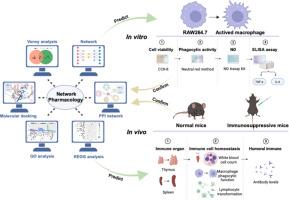桑黄柏类黄酮的免疫调节作用:增强免疫力和恢复免疫功能的重要启示
IF 4.7
2区 医学
Q2 IMMUNOLOGY
引用次数: 0
摘要
免疫系统对维持体内平衡、抵御外部威胁和调节炎症至关重要,是人类健康的基石。三黄菇是一种天然药用蘑菇,含有黄酮类化合物,可以提高免疫细胞活性,潜在地改善人体健康。本研究通过网络药理学和体外、体内实验研究了桑黄茯苓总黄酮的免疫调节作用。网络药理学鉴定出PBF化合物靶向46个免疫抑制相关靶点,其中芦丁是一个关键成分。分子对接证实芦丁对核心靶点IL6、TNF和IL1B具有较强的结合亲和力。PBF在体外激活小鼠巨噬细胞,促进其增殖、吞噬活性、NO生成和细胞因子调节。在体内,PBF通过促进正常小鼠胸腺和脾脏的生长,提高细胞和体液免疫,恢复免疫抑制小鼠的免疫功能来增强正常小鼠的免疫功能。这些发现强调了PBFs在提高免疫力和治疗免疫抑制性疾病方面的潜力。本文章由计算机程序翻译,如有差异,请以英文原文为准。

Immunomodulatory effects of Sanghuangporus flavonoids: Key insights into enhancing immunity and restoring immune function
The immune system is vital for maintaining homeostasis, defending against external threats, and regulating inflammation, forming the cornerstone of human health. Sanghuangporus, a natural medicinal mushroom, contains flavonoids that may increase immune cell activity, potentially improving human health. This study investigated the immunomodulatory effects of Sanghuangporus flavonoids (PBF) via network pharmacology and in vitro and in vivo experiments. Network pharmacology identified PBF compounds targeting 46 immunosuppression-related targets, with rutin emerging as a key component. Molecular docking confirmed the strong binding affinity of rutin for the core targets IL6, TNF, and IL1B. In vitro, PBF activated mouse macrophages, promoting their proliferation, phagocytic activity, NO production, and cytokine regulation. In vivo, PBF enhanced immune function in normal mice by promoting thymus and spleen growth, increasing cellular and humoral immunity, and restoring immune function in immunosuppressed mice. These findings highlight the potential of PBFs in increasing immunity and treating immunosuppressive diseases.
求助全文
通过发布文献求助,成功后即可免费获取论文全文。
去求助
来源期刊
CiteScore
8.40
自引率
3.60%
发文量
935
审稿时长
53 days
期刊介绍:
International Immunopharmacology is the primary vehicle for the publication of original research papers pertinent to the overlapping areas of immunology, pharmacology, cytokine biology, immunotherapy, immunopathology and immunotoxicology. Review articles that encompass these subjects are also welcome.
The subject material appropriate for submission includes:
• Clinical studies employing immunotherapy of any type including the use of: bacterial and chemical agents; thymic hormones, interferon, lymphokines, etc., in transplantation and diseases such as cancer, immunodeficiency, chronic infection and allergic, inflammatory or autoimmune disorders.
• Studies on the mechanisms of action of these agents for specific parameters of immune competence as well as the overall clinical state.
• Pre-clinical animal studies and in vitro studies on mechanisms of action with immunopotentiators, immunomodulators, immunoadjuvants and other pharmacological agents active on cells participating in immune or allergic responses.
• Pharmacological compounds, microbial products and toxicological agents that affect the lymphoid system, and their mechanisms of action.
• Agents that activate genes or modify transcription and translation within the immune response.
• Substances activated, generated, or released through immunologic or related pathways that are pharmacologically active.
• Production, function and regulation of cytokines and their receptors.
• Classical pharmacological studies on the effects of chemokines and bioactive factors released during immunological reactions.

 求助内容:
求助内容: 应助结果提醒方式:
应助结果提醒方式:


